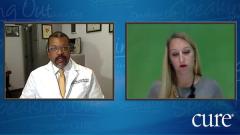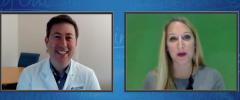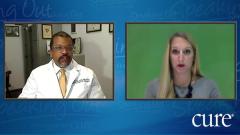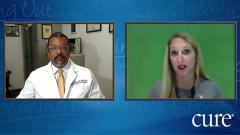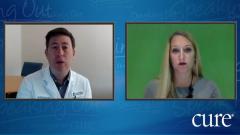
What to Know About Lung Cancer and COVID-19
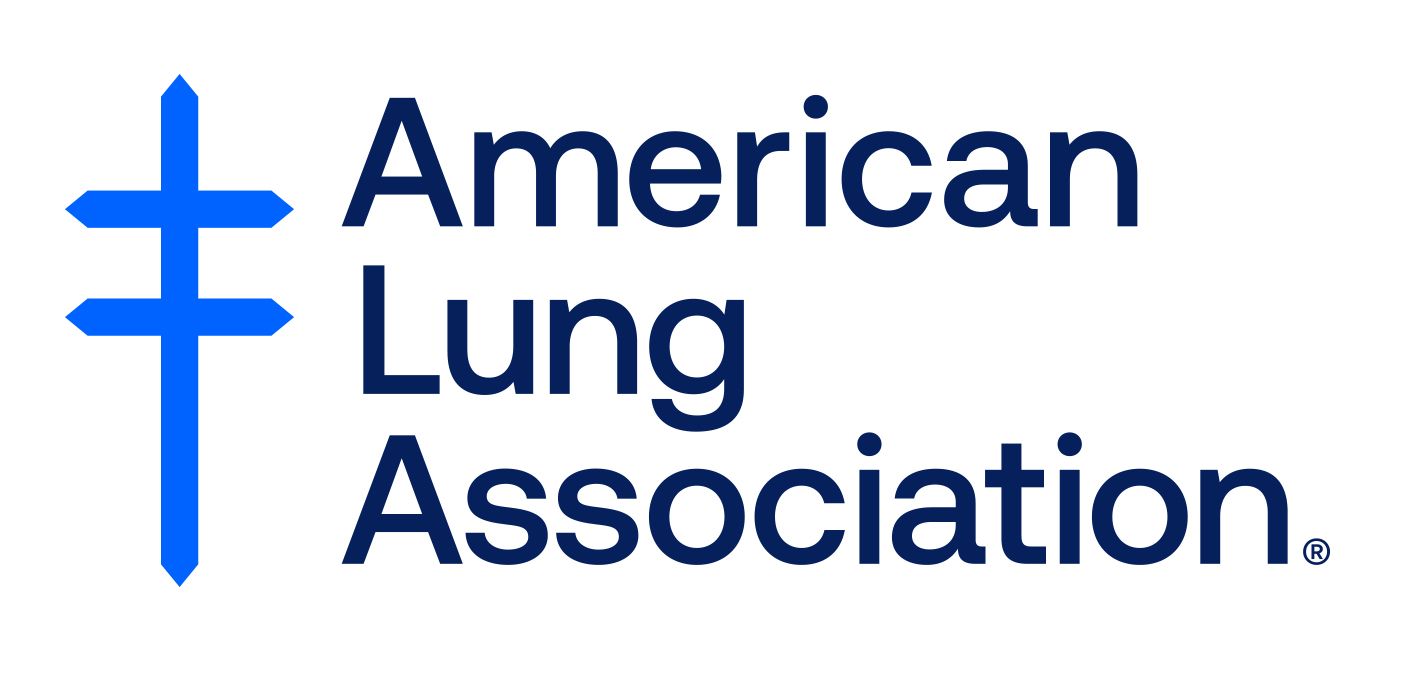
Kristie L. Kahl: Can you explain the effect that COVID-19 and the pandemic have had on lung cancer patients?
Dr. David Cooke: So we all have been affected by this terrible global pandemic, with COVID-19. And it's changed all of our lives. And that is for individuals at each walk of life in each community, especially for our cancer community as well, with COVID-19, we've had too many health care centers and medical centers and cancer centers had to adjust their practices to make the environment safe for their patients. And we worried that that could affect cancer disparities, and cancer treatment access.
Kristie L. Kahl: What is the risk associated with lung cancer and contracting the coronavirus?
Dr. David Cooke: Well, as of this writing, we don't have a direct relate link to COVID-19 and lung cancer. But we do have data that suggests that some patients who are being treated for cancer, whether it's lung cancer or other types of cancers, can be at high risk for contracting the virus. And at high risk for dying from the virus once contracted. Now, why is that? We don't have high level data to explain that. One, it could just be exposure to other COVID-19 infected individuals in a group setting, right? Or their lungs could be at risk, whether it's a damage long, or whether it's a at risk immune system from treatment that makes them higher risk for developing COVID-19 or dying from COVID-19. There's a lot of data and publications that are out there. And it's difficult to sift through that data to see what is high-level evidence.
Kristie L. Kahl: How has the pandemic affected patients and how they're receiving their treatment?
Dr. David Cooke: So the head of the National Cancer Institute has worried that with the COVID-19 global pandemic, we will have delays in the diagnosis of cancer delays, in the treatment of cancer, and that we might have increased mortality. Compared to the good news that we've had, prior to the pandemic, where mortality from cancer, specifically lung cancer was diminishing. Now, why would we have delays? One is that based on the local area of COVID-19, incidence, some elective or non-urgent imaging has been temporarily delayed, and that might include lung cancer screening. In addition, in the beginning part of the United States pandemic, specifically in March, there was a recommendation for reducing or eliminating elective surgery across the board. Now, we all know or intuitively know that cancer surgery is really not elective, and in many cases, it should be considered as urgent. At the very minimum, it should be considered as essential. And so for that brief period, we had a dip in cancer-related surgery. However, the American College of Surgeons has partnered with other clinical leaders in surgery for lung cancers. Specifically, they partnered with the Thoracic Surgery Outcomes Research Network to publish guidelines for the management of essential thoracic oncology surgery during the National COVID-19 pandemic. And what those guidelines looked at was what was happening in your local area on the ground in regards to COVID-19. What percentage of your hospital beds and ICU were dedicated to COVID-19 patients? And there we define those into tiers tier 1, tier 2 and tier 3. So if you are a tier 1 hospital, with just a modest impact of COVID-19, then lung cancer should be considered an essential surgery. You should move forward. If you're a tier 2, then you should look at your environment. And are you able to provide that surgical care for lung cancer patients. And if you're tier 3, then you need to find another Medical Center to help or an alternative therapy to help you treat those patients with lung cancer. And because of that, we've been able to provide this essential care for our lung cancer communities during the COVID-19 pandemic. And that goes beyond surgery. It goes with radiation oncology, medical oncology, treatment, and enrollment and clinical trials as well.
Kristie L. Kahl: Can you discuss a little bit further about how telemedicine is now playing a role in patient care?
Dr. David Cooke: Telemedicine is defined as an interaction between a provider and a patient. And it's real time face to face or video visits. And now, real time, telephone audio visits as well or telephone encounter. Now with the Cures Act as part of the federal government's response to the COVID-19 pandemic, they have deregulated telemedicine during the COVID-19 pandemic. And because of that, we've seen an increase in telemedicine usage amongst our patients. So the Centers for Medicare and Medicaid Services recently released their data for Medicare beneficiaries and use of telemedicine and what they found was that for Medicare beneficiaries, the use of telemedicine was about 25% to 29%, which is extremely high compared to the 1% to 2%. That was prior to the COVID-19 pandemic. Now, what's fascinating with that CMS data is that the telemedicine usage amongst communities of color, such as Black African Americans, and Hispanics and Asian Americans is similar to the use of telemedicine amongst white Americans. So that is exciting because it may point to telemedicine as a way to fighting disparities within specificity, especially cancer care. What we do know about COVID-19 is that it disproportionately affects communities of color.
So you look at Black and African Americans, when dependent upon the age bracket, we see the mortality of after COVID-19 infection is about six to nine times higher depending on the age bracket as a white Americans. So when you look at the usage of telemedicine when it's about equal, that is an opportunity to care for all Americans, but also our communities of color in a safe manner. So no longer bringing them into an environment where they might be at risk for COVID-19 whether it's the hospital environment, or whether it's the transportation environment to get to the hospital, such as public transportation. And we can do cancer care via telemedicine. For instance, if you look at my practice, which is a thoracic surgical oncology lung cancer practice, about 25% to 30% of my practice currently, is via telemedicine and I can do a telemedicine workup, exam all the way to the point of care for me, which is surgery. And so I'm minimizing that exposure of that lung cancer patient to a potentially COVID-19 environment, bringing them into our hospital for surgery, which has multiple layers of COVID-19 precautions for our patients during doing that potentially life-saving standard of care, minimally invasive surgical resection of their lung cancer and then putting them into a cancer survivorship surveillance program that's based on telemedicine and then also talking to them about both neoadjuvant before surgery, as well as after surgery, therapy to clinical trials, all in a safe manner. So that shows you that telemedicine is a really key intervention during this COVID-19 pandemic. Currently at UC Davis Comprehensive Cancer Center. We are looking at patient-centered outcomes research to boost telemedicine usage in our vulnerable communities of color, specifically African Americans as well.
Kristie L. Kahl: Do you have any advice for lung cancer patients and how they can still stay safe and healthy throughout all of this?
Dr. David Cooke: What I would recommend is having lung cancer patients talk to their care provider about the uses of telemedicine. Can they undergo their visits via telemedicine, whether it's face to face video, or whether it's audio encounter that is oftentimes built in to the electronic health record patient portals that are accessible by patients, or now with the cares act, even commercial smartphone. video conferencing apps can be used for telemedicine as well, but check with your care provider, regardless of COVID-19 as your care provider, what resources are available to me? Is lung cancer screening still available to me coming in for standard care therapy, such as surgery, is that still available to me? So this is the essential surgery and not elective surgery? And are there therapeutic clinical trials that are available to me, and I encourage those individuals to look at those opportunities and ask your care provider what's going on with COVID-19 at the local level, and if their medical center cannot cannot provide those cancer, specifically lung cancer treatments because of the COVID-19 rate at that hospital. Can they send you to another Medical Center that has high level of care, high level lung cancer care, and it's not overwhelmed by the COVID-19 pandemic.

